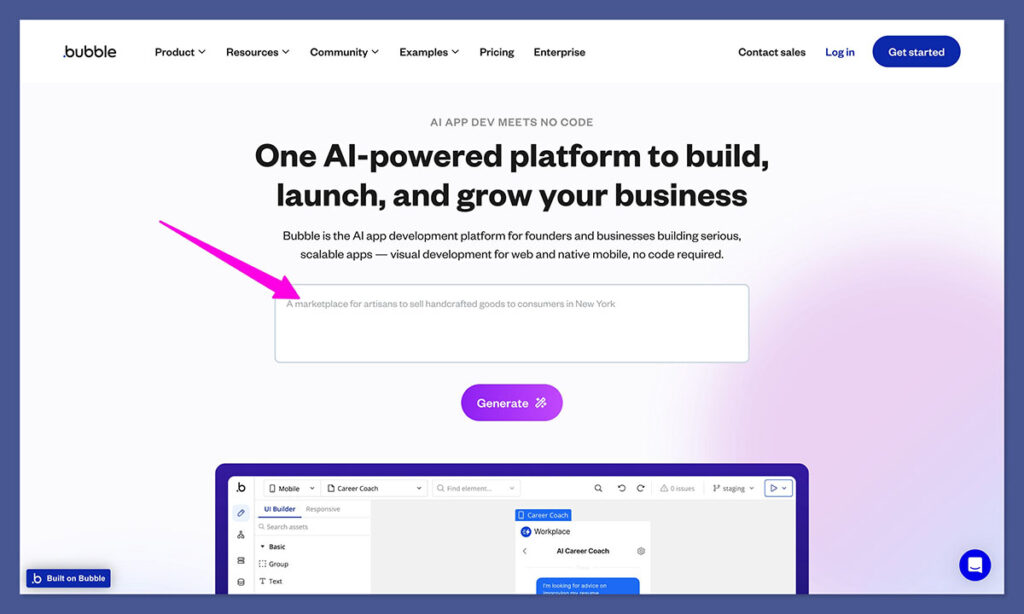Shopify and Bubble are two powerful platforms, but they serve very different goals. After testing both platforms thoroughly and building real-world projects with each, I can tell you exactly where each one shines—and where it struggles.
So if you’re wondering which one to use for your next online store or app, here’s what you need to know.
Quick Verdict
Shopify – Best overall for launching and growing an online store
Bubble – Best for building a custom web application or MVP
In this breakdown, I’ll compare Shopify and Bubble across pricing, features, ease of use, design, and more—plus, I’ll share my hands-on insights from using both.
Shopify vs Bubble: At a Glance
| Feature | Shopify | Bubble |
|---|---|---|
| Best For | Selling products online | Building custom apps |
| Ease of Use | Beginner-friendly | Developer-friendly |
| Templates | 190+ (13 free) | Full custom design |
| Payment System | Built-in | Manual setup |
| App Store | 8,000+ apps | Limited plugins |
| Checkout | Secure, optimized | Must be built from scratch |
| SEO Tools | Built-in | Manual setup required |
| Starting Price | $29/month | Free (paid plans for scaling) |
| Free Trial | 3-day free + $1/month for 3 months | Free until launch |
Best for Selling Online: Shopify Wins Easily
If you’re setting up an online store, Shopify is built for you. It handles everything from storefront design to checkout and shipping.
Bubble, on the other hand, is designed for creating complex workflows and custom apps—it doesn’t come with any built-in selling tools.
Shopify’s selling features include:
- Inventory management
- Abandoned cart recovery
- Product variants
- SEO tools
- Discount engine
- One-page checkout
- Native integrations with Facebook, Instagram, TikTok, and Amazon
With Bubble, you’d have to build all of that manually—or integrate it via API.
My Take:
I’ve built stores with Shopify in under a day. With Bubble, setting up a product page with a functioning checkout takes days or even weeks.
Shopify is the winner for selling. Hands down.
Best for Custom Builds: Bubble Is in a League of Its Own
Shopify is great if you’re selling standard products. But if you’re building something more complex—like a booking platform, marketplace, or SaaS tool—Bubble gives you the flexibility.
If you’re curious about how top Shopify stores are set up, you can use our Shopify App Detector to uncover the exact apps they’re running. It’s a quick way to see what’s working for competitors, get ideas, and fine-tune your own stack without guessing.

With Bubble, you can:
- Create custom user flows and dashboards
- Design responsive layouts from scratch
- Build database logic visually
- Connect APIs
- Set user roles and permissions
This is great for technical founders or those with dev support. But if you’re just trying to launch a product page with a buy button, it’s overkill.

My Take:
I built a custom lead gen dashboard in Bubble that would’ve been impossible with Shopify.
If you’re not selling a product but building a tool, Bubble is your best bet.
Pricing: Shopify Is More Predictable
| Plan | Shopify | Bubble |
|---|---|---|
| Free Trial | 3 days + $1/mo (3 months) | Free (until launch) |
| Entry Plan | $29/month | Free or $32/month |
| Mid Tier | $79/month | $134/month |
| High Tier | $299/month | $399+/month |
Shopify gives you full selling capability from the cheapest plan. Bubble’s free plan is generous, but once you launch and scale, costs rise fast—especially if you need database scaling or server capacity.
My Take:
Shopify’s pricing is simpler and focused on sellers. Bubble’s pricing is fine for devs or startups who want control but gets expensive as traffic grows.
Ease of Use: Shopify Is Way Simpler
I’ve walked total beginners through Shopify. The onboarding is fast, the interface is clear, and you’re guided step-by-step to go live.
Bubble is visual, but it’s not intuitive. You need to understand logic, workflows, and databases. If you’ve never built apps, expect a steep learning curve.
| Platform | Onboarding | Beginner-Friendly? |
|---|---|---|
| Shopify | Fast | Yes |
| Bubble | Complex | No (dev skills needed) |
My Take:
I can set up Shopify blindfolded. With Bubble, I’m watching videos, checking forums, and debugging constantly.
Shopify wins for usability.
Checkout & Payments: Shopify Is Built for This
Shopify’s checkout is one of the most optimized in the industry. You get:
- PCI compliance
- Shopify Payments
- Apple Pay, Google Pay
- Cart recovery
- Discount codes
- Integrated tax and shipping rules
Bubble? You have to:
- Build your cart logic
- Integrate Stripe manually
- Create post-purchase workflows
- Handle security and compliance
My Take:
In Shopify, checkout is ready out of the box. In Bubble, you’re coding logic and troubleshooting API calls.
Shopify destroys Bubble on payments.
Design and Templates: Flexibility vs Simplicity
Shopify offers 190+ templates, all optimised for selling. You can customise themes using a visual editor or dig into the code (Liquid).
Bubble has no templates—just a blank canvas. You can build anything. But you start from zero.
| Design Flexibility | Shopify | Bubble |
|---|---|---|
| Templates | ✅ | ❌ |
| Theme Store | ✅ | ❌ |
| Full Control | ❌ | ✅ |
My Take:
Shopify’s templates get you live faster. Bubble gives you power but no shortcuts.
Use Shopify for speed; Bubble if you need total control.
SEO and Marketing Tools: Shopify Comes Prepared
Shopify is SEO-ready out of the gate. It gives you:
- Meta fields
- Sitemap.xml
- Schema.org markup
- Alt text, URL edits
- Blog and content tools
- App integrations with Semrush, Klaviyo, etc.
Bubble? You need to:
- Manually define meta tags
- Build a sitemap
- Add schema manually
- Use custom logic for redirects and links
My Take:
Shopify is designed to help you rank and sell. Bubble is flexible, but you have to do all the SEO work manually.
Shopify wins again.
App Store and Extensions
| Feature | Shopify | Bubble |
|---|---|---|
| Number of Apps | 8,000+ | ~900 |
| Email Marketing | Built-in or apps | Needs plugin |
| Reviews | Built-in or apps | Needs plugin |
| Subscription Products | Via app | Must build from scratch |
Shopify’s app store makes it easy to extend your store with one click. Bubble? You’re building or integrating manually.
My Take:
Shopify wins for store functionality and speed. Bubble wins for custom apps that don’t exist elsewhere.
Customer Support: Shopify Is More Polished
Both platforms offer support, but Shopify’s 24/7 live chat and robust help centre are easier to navigate.
Bubble’s support is community-based with limited direct help on lower tiers. Expect to spend time on forums and Discord.
Final Verdict: Shopify vs Bubble
Choose Shopify if:
- You want to sell products fast
- You don’t want to deal with technical complexity
- You care about SEO, payments, templates, and app integrations
- You want to scale your store without custom dev work
Choose Bubble if:
- You’re building a custom app or SaaS tool
- You need total design and logic freedom
- You have time (or a dev) to build complex workflows
- You’re not just selling products—you’re building a product
Overall Winner: 🏆 Shopify for eCommerce
Runner-up: 🧠 Bubble for custom apps

Comments 0 Responses